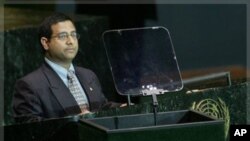The United Nations Special Rapporteur who assesses the human rights situation in Iran warned Wednesday of “a pattern of systemic violations” of the rights of persons in that country. Ahmed Shaheed told the U.N. General Assembly committee that deals with such issues that the violations include a “dramatic increase” in government-ordered public executions; the persecution of religious and ethnic minorities; and the erosion of civil and political rights.
Ahmed Shaheed told the committee that Iran’s human rights record has attracted a lot of criticism because of a lack of substantive cooperation with the U.N.’s human rights system and frequent reports of suppression of rights in Iran.
“These include allegations of obstructing free and fair elections, denial of freedom of expression and assembly, allegations of deprivation of the right to education, the harassment and intimidation of religious and ethnic minorities, human rights defenders as well as civil society and religious actors,” Shaheed said.
The special rapporteur also noted his concerns about the administration of justice and the lack of proper safeguards, the status of women, and the torture and poor treatment of detainees. But it is the widespread use of the death penalty that attracted his particular concern.
In his report, Shaheed said Iranian authorities officially announced more than 200 executions so far this year - at least 83 of them in the month of January alone. He said the majority of death sentences have been handed out in drug-related cases.
“In about 70 percent of recent cases, these sentences related to drug offenses. And that of course is the issue that we raise - that drug offenses do not constitute a serious crime that would call for [the] death penalty,” Shaheed said.
In addition to executions, his report details the mistreatment and imprisonment of opposition politicians, journalists, student activists, artists, lawyers and even environmentalists.
The U.S. representative, John Sammis, expressed Washington’s concern about the treatment of two prominent opposition politicians - Mir-Hossein Mousavi and Mehdi Karroubi, who have been under house arrest with their wives since February. He also noted the generally disturbing statistics in the special rapporteur’s report.
“Thirty-four journalists detained as of the end 2010. Forty-two attorneys facing prosecution since 2009. More than 100 members of the Baha’i community currently in jail. Three political prisoners executed in January amid a spike in officially announced executions this year; and reports that more than 100 juveniles are on death row,” Sammis said.
Iran’s representative dismissed the special rapporteur’s findings as biased, lacking balance and failing to reflect human rights achievements in Iran.
“By not reflecting faithfully the actual situation of human rights in the Islamic Republic of Iran, rather assembling a catalog of poorly resourced, exaggerated and outdated allegations, the presentation of this report we believe is a very conspicuous manipulation of the United Nations human rights system. Its content is absolutely unjustified, unwarranted, and unacceptable for my country,” he said.
The special rapporteur urged Tehran to allow him to visit to discuss the situation. The last time the Iranian government allowed a special rapporteur in was in 2005.
But Shaheed did welcome a meeting with the Iranian U.N. envoy Tuesday in New York, which he said was frank and friendly.
Special rapporteurs are independent experts appointed by the U.N. Secretary-General to investigate allegations of human rights violations.
Ahmed Shaheed took up his post in August.




